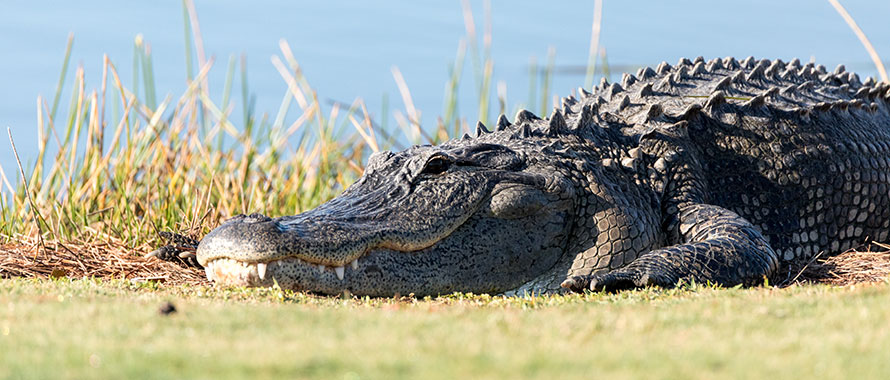An 80-year-old Florida woman tragically died July 15 after falling into a pond and being “grabbed” by two alligators, according to reports. The incident occurred at the Boca Royale Golf and Country Club in Englewood, Florida, where the woman reportedly fell into a pond located along the course and struggled to stay afloat before the alligators attacked.
Featured Solutions
“It is heartbreaking,” said Kelly Cruz, Underwriter, Commercial Insurance, Burns & Wilcox, Orlando, Florida. “As Floridians, we sadly do hear about these stories, and a lot of individuals have a false sense of security and do not realize we share this world with nature and there are opportunistic predators out there. These incidents are just devastating.”

It is very hard to control the population of alligators. I would encourage companies and homeowners associations to do their due diligence toward prevention, which can help in their defense if a claim arises involving an alligator.
Less than a week after the golf course attack, a 43-year-old man was attacked by an alligator at Lake Manatee Fish Camp in Manatee County, Florida, on July 21 and suffered “serious injuries to his arm.” Another attack reportedly took place July 24 when a 13-year-old girl was bitten by an alligator near a boat ramp in Zolfo Springs, Florida. From golf courses to lakefront homeowners associations, any property in an alligator-prone area should have precautions in place to help prevent attacks and carry Commercial General Liability (CGL) Insurance to offer protection in the event of a lawsuit.
“It is very hard to control the population of alligators,” said Ken Brooks, Senior Underwriter, Commercial Insurance, Burns & Wilcox, Tampa, Florida. “I would encourage companies and homeowners associations to do their due diligence toward prevention, which can help in their defense if a claim arises involving an alligator.”
Fatal alligator attacks rare, but more than usual so far in 2022
This year has had more alligator attacks than usual, USA Today reported on July 22. The fatality on July 15 was the third U.S. alligator-attack death of 2022; of those, two occurred in Florida, while state data shows an average of one fatal injury in Florida almost every three years.
When an individual is injured or killed in a wildlife attack, the owner of the property where the accident took place could be held liable, depending on the circumstances, Cruz said. “It really depends on if they find the owner to be negligent or not and the circumstances of how the individual was injured or killed,” she explained.
The costs associated with this type of lawsuit — from legal defense to potential settlements — can be covered by CGL Insurance, which is designed to cover third-party bodily injury and property damage. Golf courses, homeowners associations, hotels, retail stores, swimming areas and other commercial properties should all carry this policy, Cruz said.
While alligator populations are not necessarily rising, some animal experts believe human population growth and construction on swamps and marshes is pushing more alligators out of their habitats and into ponds and canals to survive, Fox 4 News in Florida reported on July 18. Humans feeding wildlife is another problem, the report noted.
“There is a massive population of alligators in Florida and they can be aggressive during certain times of the year,” Brooks said.
Still, fatal attacks are exceedingly rare, he said. According to the recent USA Today report, a Florida resident’s chance of an unprovoked alligator attack is around 1 in 3.1 million. “Growing up in Florida, it is such a rare occurrence,” Brooks said.
Losses can be severe, excess insurance limits advised
Outside of states where alligators are common, other types of wildlife can pose a threat and subsequent liability risk. Last summer, multiple individuals were bitten by a coyote at the largest park in Vancouver, British Columbia, CBC News reported in August of 2021, and a coyote bit a 6-year-old boy at a golf course in South San Jose, California, in June of 2021, according to NBC Bay Area.
In 2016, a 2-year-old boy from Nebraska was dragged into the water and killed by an alligator at Walt Disney World while playing on the beach of the Seven Seas Lagoon at the Grand Floridian Resort & Spa. After the tragedy, Disney added new barriers and replaced “no swimming” signs with signage explicitly warning guests about the presence of alligators, according to an NBC News report. The boy’s parents announced at the time that they would not sue Disney, though a family spokeswoman could not say if a financial settlement had been reached, the Herald-Tribune reported.
Commercial property owners in high-risk areas should check with their insurance broker about any exclusions on their CGL Insurance for wildlife or animal liability, Cruz said. They may also be advised to carry Excess Liability Insurance, which can provide higher liability limits on top of existing policies.
“Loss of limb or loss of life is very devastating,” she said. “A settlement could be from a couple hundred thousand dollars to in the millions if they are found to be negligent. It could be extremely devastating to a business as far as a claim goes.”
Brooks agreed, explaining that in the event of a death, the settlement “could be enormous.”
An Excess Liability Insurance policy is another way to “protect yourself and your assets,” Cruz said. “With inflation these days, $1 or $2 million limits can go quickly, especially with litigation costs the way they are. Excess Liability Insurance policies are a good value and they do a lot when you need them.”
Consider board member liability, risk mitigation efforts
According to a 2020 report in REALTOR Magazine, a record number of U.S. homeowners were living in communities with a homeowners association or a condo board, with Florida having the second highest number of these associations in the country. Since many of the communities have lakes, ponds, pools, clubhouses, tennis courts and other facilities, they must consider the risk of third-party bodily injuries, Brooks said — including the risk of an alligator incident in higher-risk regions.

Homeowners associations need to buy a CGL Insurance policy for the association and they need to buy a D&O Insurance policy for the individuals who volunteer on the board.
Homeowners associations should always carry Directors & Officers (D&O) Insurance, which can respond to lawsuits against board members alleging negligence in their roles, responsibilities and decisions. “Homeowners associations need to buy a CGL Insurance policy for the association and they need to buy a D&O Insurance policy for the individuals who volunteer on the board,” Brooks said.
D&O Insurance is “about protecting the decisions of the directors and officers on that board,” Cruz said. “If they make the wrong decisions or misuse money, they are held accountable,” she said. “If the board decided not to put more signage on the lake because it looked ugly, for example, and then there is an alligator attack, somebody could be liable because they decided aesthetics were more important than safety. Safety over everything is number one in every business.”
Safety precautions for these associations could include installing explicit warning signs near bodies of water, installing fencing or other barriers, reporting alligator sightings to Florida’s Nuisance Alligator Hotline at 1-866-FWC-GATOR (1-866-392-4286), and encouraging residents to also use the hotline for sightings, Brooks said.
“These HOA boards should circulate this number to their residents,” he said. By taking these steps and others, associations are “doing their due diligence” to protect residents and ultimately “building a case that they are not liable in case something horrible happens,” Brooks explained.
Businesses operating on the water should keep logs of individuals heading out and coming back, require groups of at least two after it gets dark at night, and require liability waivers, Cruz suggested. They should also emphasize guest education.
“Education is huge. Not to make individuals scared, but to make them respect their surroundings and understand that we are not alone,” she said. “Children, lone adults, and pets can all be very easy prey. Any businesses that operate near waterways in Florida should be diligent.”






